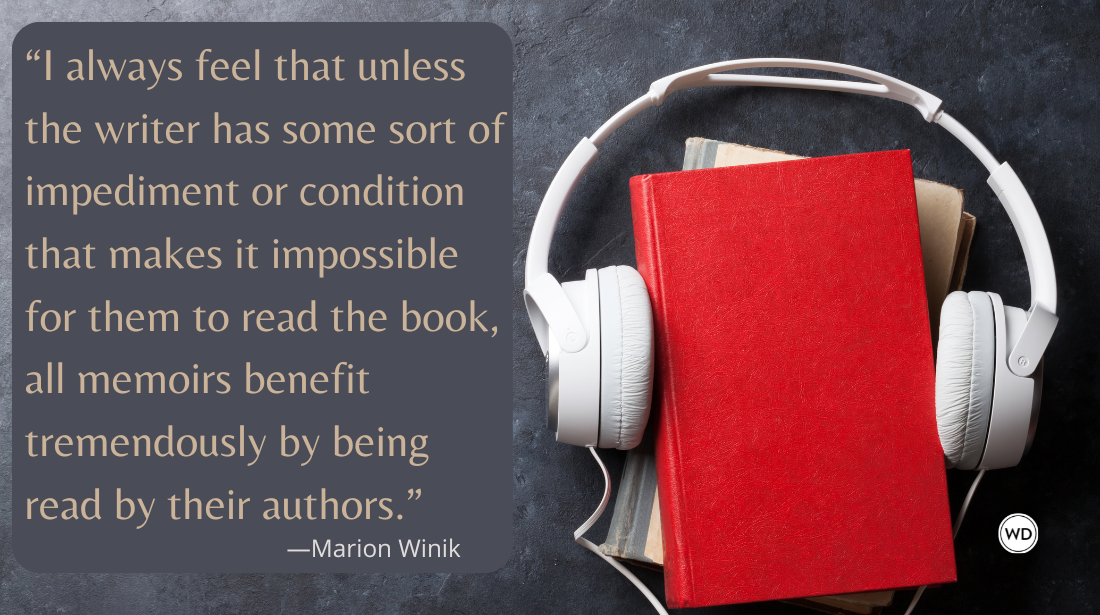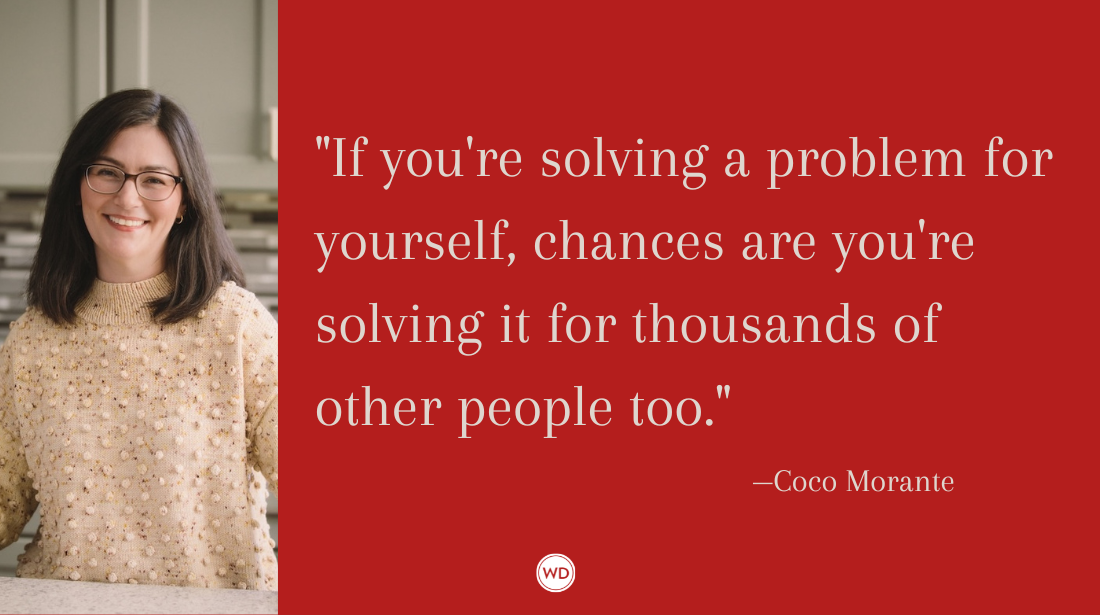10 Ways to Tell if Your Story Should be a Memoir or a Novel
Should your story be fictionalized or be a true telling of your life? You have to decide. Here are 10 factors to consider.
You want to write about something that happened to you. You operated an air charter service in the scorched red Australian outback, or your whole family drank excessively, or you were on an ordinary walk with your husband when he was killed midsentence by a runaway van that drove a parking meter into his head. Should you write about your experience strictly as a memoir, or use the story as the basis for a novel?
Perhaps you’ve been puzzling over this question. You might have even gone back and forth several times already, globally changing the pronouns from “him” to “I” and back again. Maybe you feel torn because you want to tell the truth about what happened, but you’re worried about embarrassing someone involved (or even yourself). Maybe you’re so unsure that you’re thinking about it as an “autobiographical novel,” that once-popular genre in which authors created characters who they just happened to exactly resemble, as did Harper Lee, whose background is the same as that of her famous To Kill a Mockingbird protagonist, Scout Finch. In today’s market, Lee might well have considered approaching the story as a memoir (interestingly, it’s written in the form of one, almost as if she wrote it just as it happened and at the last minute changed all the names and called it fiction).
Or what if you’ve been reimagining your story as a novel to gain some distance and perspective on your own experiences, and now an agent suggests you change all those little details back and publish it as a memoir? If so, you’re in good company. A surprising number of bestselling memoirs, including Mary Karr’s The Liars’ Club, Tobias Wolff’s This Boy’s Life, and, famously, James Frey’s A Million Little Pieces, started off as novels. On the flip side, writers with lucrative contracts for memoirs have ended up publishing their stories as fiction.
You have to decide. A book must be one thing or the other. Not only will your genre determine how you approach the story, but it will also determine how readers perceive it, how it’s sold, and where it’s shelved.
So which is the best choice for your story? Here are 10 factors to consider.
Good Reasons to Write It as a Novel
1. I, uh, made up some things.
A memoir must be essentially nonfiction: That’s your pact with the reader, who is mesmerized by the fact that this really happened to you. The publishing world has been nervous about this ever since Frey shopped A Million Little Pieces as a novel, but then published it as a memoir—with fictional elements still included. Everybody understands that a memoir can employ reconstructed scenes and dialogue to dramatize the story (though it doesn’t hurt to come out and say you’ve done so—in fact, these days most memoirs begin with an Author’s Note stipulating that some names and events have been altered to protect people’s privacy and for the sake of the story). But you can’t change a few hours in an Ohio police station into three months in prison, as Frey did, without breaking that vital pact with your reader. Nor can you downsize your family: When Jamaica Kincaid decided to delete her older brothers from her manuscript Annie John to keep the emotional focus where she wanted it, on a girl and her mother, she cast the story as fiction—even though it was essentially true.
2. I like my family and want them to continue talking to me.
You can change the names and disguise the identities of some people, but obviously you can’t say, “My father, I’ll call him ‘Ned’ …” Family members will be caught in the flare of your flashbulb no matter what you call them. You might find that you are reluctant to risk embarrassing them, but that you’re also unwilling to just delete all that messy but rich material and issue a sanitized and flattering account. Even successful writers have edited themselves to the detriment of their resulting memoirs (as I believe Gail Caldwell did when she wrote Let’s Take the Long Way Home, about her friendship with fellow writer Caroline Knapp, and Anne Dillard did in An American Childhood, which, while aesthetically pleasing, lacks the life and drama that honest portrayals of flawed supporting characters can bestow on a work).
Sometimes the only way you can free yourself to tell the truth is through fiction. That was the choice of Martha Sherrill, who decided to repay a hefty advance to write a memoir about her father because she wasn’t willing to expose a family secret that surfaced during the writing. “My family is important to me,” she says. Her story instead became the basis for a novel, The Ruins of California.
3. I am uncomfortable relying on my memory.
Anna Quindlen, a former New York Times reporter, and columnist, opted for fiction over memoir when she began writing books. She had no choice: She found herself checking old weather charts before she could publish the line, “It was very cold the night my mother died.” She worried: Was it very cold, or was that just the trick memory played on a girl who was sick and shivering, at least metaphorically? Quindlen realized that this determination to get every little detail right might hamstring her as a memoirist, a form of writing in which the impressions of memory are part of the package. In her novels, she can arrange the weather as she likes.
Maybe you want to write about the apartment building your mother managed in the ’30s, but you were a little kid at the time. Your parents are not around to interview. Research can fill in some holes, but you will have to do a lot of inventing, and invention equals novel. (The word novel, after all, means “new,” while memoir comes from “to remember.”)
4. The events I’m writing about didn’t happen to me.
By definition, a memoir is a record of events written by a person having intimate knowledge of them and based on personal observation. So you can use all the great details and insider knowledge you can harvest from family accounts to write a gripping story based on your father’s experiences as a prisoner in World War II, but unless you yourself were trapped behind barbed wire, you can’t write it as a memoir; in spite of your best efforts, you’re still imagining what happened. Laura Manivong, author of Escaping the Tiger, based on her husband’s experiences as a Laos refugee, wrote it as a novel both because “the holes in my knowledge and my husband’s memory were too big,” and because it’s not her story.
5. My inspiration for this story is a simple spark from real life, not a complete story arc.
A story requires an arc—a beginning, middle, and end—and a main character whose actions drive the plot. In a good memoir, you try a lot of different things to solve your problem. You have setbacks, make mistakes and push on, until you either achieve your driving goal or desire, or don’t, or change your mind about what you really want, or whatever.
I wanted to write about the two years my mother spent in hospice care at her home before she died (of course I took notes while she napped). But in the real version of my story, I wasn’t an action hero. My mother was going to die. I was one of her daughters, reacting to events, but not initiating them the way a good protagonist should. I discovered it would not have made an exciting book. But in a fictionalized account, I could keep all the good stuff while inventing a more dramatic version of myself—maybe a character whose run for state senate is threatened by her absences and her mother’s deathbed revelations (“I should tell you, I set that fire myself …”).
Similarly, a student of mine is struggling to write about how her troubles at the hands of an abusive adopted brother ended when he died in a car crash. While that’s a true story with a lot of event, in real life the narrator’s change came about from a change in her circumstances, not from within. To write a more engaging story with a compelling protagonist, a novel would be a better form in which to explore the story that inspired her.
Good Reasons to Make It a Memoir
6. Other people will strongly identify with my story, and I want to be able to share the truth of what happened.
You may want to talk to groups, go on talk shows, and connect with readers who are also mothers, or cancer survivors, or men who graduated from medical school after the age of 50. If your true story relates to a social issue you’re passionate about—perhaps you have an autistic child, or are adopted, or were tossed out of the Air Force for being gay—it makes sense to write it as a memoir.
7. I’m unwilling to work around inconvenient or stranger-than-fiction facts just because a novel demands a shapely plot.
Beth Kephart, author of the memoir Still Love in Strange Places, has said, “When you draw from real life for the purposes of fiction, you have to be willing to discard details that have mattered deeply, to blur edges of the truth, to shape newly.” Still Love in Strange Places began as a novel about El Salvador and became, through the course of 15 years of writing and rewriting, a strictly personal account. “… The risk of imagining seemed too great, the possibility of getting some part of it wrong too extreme,” Kephart explained. “So I started over, and simply wrote the truth.”
Another thing to consider is that a novel must create a believable world, one in which a bizarre event can look made up or over-the-top. Memoir allows you to tell the stories that would seem too convenient, or sentimental, or jarring in a novel. By its very nature memoir says, “This can happen. This did happen.” Tom Grimes, author of the memoir Mentor, says that if he’d included a story like that of his sister’s suicide attempt in a novel, “it may have seemed heavy-handed.” But in his memoir, readers were moved by the passage. He says, “I think that’s because they’re reacting to something true.”
8. I find the unlimited choices of fiction overwhelming.
You may be happier with the more confining environment of nonfiction, which doesn’t allow you to make Dad an astronaut instead of an accountant.
I know I am. I tried to fictionalize the story of my childhood, but found myself floundering amid too many choices: I’ll begin it in 1941 when my father deserts in Hawaii. No! When my mother flops as a showgirl in Las Vegas and my dad meets her on a San Francisco beach. No—I’ll write it from my mother’s point of view. … I lack the confidence a novelist needs to have in her inventions. There’s nothing wrong with sticking with the facts if that’s where you’re most comfortable.
9. I have a quirky, appealing voice.
Voice is probably the most important element in memoir today, when so many subjects have already been written about. Having a strong voice means adopting a more heightened version of yourself: more emotional, more dramatic, more vulnerable, maybe funnier or more ironic. Think of Mary McCarthy, who’s written many novels but whose nonfiction account, Memoirs of a Catholic Girlhood, allowed her to unleash her acerbic personality. (In that memoir, she and her siblings, “Poor Roy’s children, as commiseration damply styled us,” were forced to live with their awful grandmother.) McCarthy herself says that such a voice can be lost in fiction: “The technical difficulties are so great, in projecting yourself, in feigning an alien consciousness.”
Likewise, a brilliant novelist may be uncomfortable writing a firsthand account of something that happened in real life: I couldn’t help but notice that Joyce Carol Oates, an indefatigable writer of fiction, seems less certain in her recent memoir, A Widow’s Story, in which she is overly emotional and also neglects to mention that she happily remarried in the middle of recovering from her husband’s death.
10. I am writing the story to explore questions about what happened.
You have to write your story, if only to get rid of it, because until you do, everything you write will lead back to the winery, or to your father’s departure, or to that strange time in Spain. You want to get to the bottom of things, find the hidden patterns, achieve insight into your own behavior and that of others. If you feel compelled in these ways, then you must set down the unvarnished truth as you remember it. “The fictional construct rarely takes you deeper into the material that you want to explore,” writes David Shields, who began his long writing career in fiction and has since turned his focus to memoir. “Instead, it takes you … into the technology of narrative, of plot, of place, of scene, of characters. In most novels I read, the narrative completely overwhelms whatever it was the writer supposedly set out to explore in the first place.”
If your imagination has always led you, if fanciful events creep into your retellings even when you try to stick to the facts, you might be a natural novelist, one prone to drawing on his own experience for inspiration, but nothing more. If, however, your story has a strong voice and can survive the scrutiny of nonfiction, it wants to be a memoir. You might even try writing a chapter of the story you’re thinking of as a piece of short fiction or, alternatively, as a personal essay—that’s a good way to test your style, your comfort zone, and even your subject matter before making a big commitment.
Either way, of course, whether you’re creating a better world from your imagination or re-creating one that you lived in, if you write it well enough, readers will be too enthralled and moved to care much whether it comes from real life or not.









